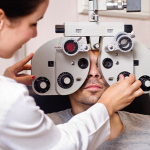Protect Your Vision With These Insights From Doctor Zuhal Butuner For People With Diabetes
Diabetes can affect many body parts, and the eyes are no exception. That’s where eye care specialists like optometrists and ophthalmologists come in. These professionals are crucial in detecting and treating diabetes-related eye diseases, such as retinopathy, glaucoma, and cataracts. According to Dr. Zuhal Butuner, those with diabetes must get a comprehensive vision exam annually at a minimum, including a dilated retinal exam. Many eye problems related to diabetes have no obvious symptoms, so patients must be aware of changes in their vision and promptly act. Patients can reduce the risk of visual impairment by controlling blood glucose levels and maintaining good overall health. Remember, we all have a role to play in helping people with diabetes live their best lives.Essential Actions Every Person With Diabetes Needs To Take
1 – Know the risks of vision loss and eye diseases for people with diabetes.
Living with diabetes already poses various challenges, but one of the most alarming is the risk of losing your eyesight.
Shockingly, 60% of people with diabetes do not receive annual eye exams, even though this group has a 25 times higher chance of blindness than those without diabetes. These individuals are especially susceptible to diabetic retinopathy, the leading cause of blindness in working-age adults. It is projected to affect 16 million people with diabetes by 2050. Eye disorders, such as glaucoma and cataracts, occur earlier and more often in those with diabetes.
However, Dr. Zuhal Butuner mentions the good news is that more than 90% of vision loss caused by diabetes can be prevented with early detection and treatment. An annual eye exam is crucial, and people with diabetes are encouraged to take careful measures to manage their blood glucose levels. Every little bit counts; intensive management can help reduce the risk of diabetic retinopathy by 27%.
2 – Empower people with diabetes to protect their vision by keeping a watchful eye on their condition.
Regular healthcare visits are crucial for individuals living with diabetes. They need to be aware of the signs of eye problems and manage their blood sugar levels. Identifying changes in their vision is essential, as it allows them to address issues early on and prevent potential vision loss. For someone living with diabetes, vision loss can have a significant impact on their quality of life. That’s why it is vital to understand the importance of looking after their eyes and actively monitoring them at every healthcare visit. Together with healthcare providers, individuals with diabetes can take a proactive approach to managing their health and preventing complications from developing.

Do you get a comprehensive eye exam with dilated pupils at least once a year?
Do you know how diabetes can affect your eyes?
Do you know what to do if you experience a sudden change in your vision?
Dr. Zuhal Butuner explains that giving honest answers or feedback can help the eye specialist gain valuable insight into your condition and any concerns you may have. You can also ask them for additional information about recommended eye care for people with diabetes. Ensure to prioritize your eye health and be transparent with your specialist.
4 – Optimal eye health for individuals with diabetes requires strict control of their blood glucose, blood pressure, and blood lipids.
For eye health specialists, there are several key points to address when working with individuals with diabetes.
First and foremost, it is crucial to promote the ABCs of diabetes management – A1C, blood pressure, cholesterol, and smoking cessation – along with a healthy lifestyle.
Additionally, individuals with diabetes must have access to health coaches, patient navigators, and community health workers whenever possible. Patients need to inform their eye health specialists about any other health exams they are receiving, including regular eye checkups and exams.
As an eye care specialist, one of the top priorities is to assess any symptoms requiring referral to a retinal specialist. It is also essential to follow up with patients to track how well they are managing their diabetes and connecting with their healthcare team.
Finally, beyond medical concerns, eye care specialists must assess socioeconomic factors impacting a patient’s health, such as food or housing insecurity, financial barriers, and lack of social support. This information can then be utilized to inform treatment decisions and plans accordingly.
5 – Take control of your diabetes with Diabetes Self-Management Education and Support (DSMES) services.
If you or someone you know is dealing with the daily challenges of diabetes, you don’t have to go alone. Dr. Zuhal Butuner says Diabetes Self-Management Education and Support (DSMES) services offer individualized guidance and resources to help you achieve better health outcomes and improve your quality of life.
With the help of a diabetes care and education specialist, you can set achievable goals for managing your condition, learn new self-care behaviors, and gain the confidence and emotional resilience to face the ups and downs of living with diabetes. And with a supportive network of peers and healthcare professionals, you’ll have the tools and resources you need to stay on track and thrive. So why not take advantage of this invaluable resource? Talk to your eye health specialist about DSMES referrals today and start your journey towards better health and well-being.
For more on Dr. Zuhal Butuner‘s insights on the health and wellness of the eyes, go to this webpage.






